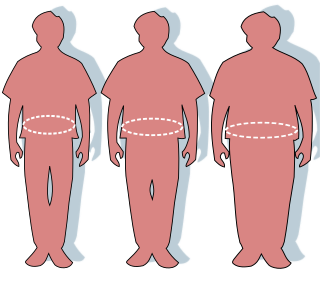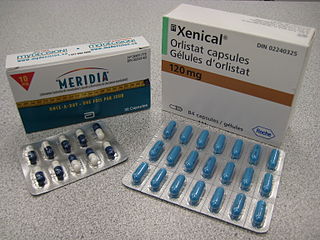
Body mass index (BMI) is a value derived from the mass (weight) and height of a person. The BMI is defined as the body mass divided by the square of the body height, and is expressed in units of kg/m2, resulting from mass in kilograms (kg) and height in metres (m).
Dieting is the practice of eating food in a regulated way to decrease, maintain, or increase body weight, or to prevent and treat diseases such as diabetes and obesity. As weight loss depends on calorie intake, different kinds of calorie-reduced diets, such as those emphasising particular macronutrients, have been shown to be no more effective than one another. As weight regain is common, diet success is best predicted by long-term adherence. Regardless, the outcome of a diet can vary widely depending on the individual.

Abdominal obesity, also known as central obesity and truncal obesity, is the human condition of an excessive concentration of visceral fat around the stomach and abdomen to such an extent that it is likely to harm its bearer's health. Abdominal obesity has been strongly linked to cardiovascular disease, Alzheimer's disease, and other metabolic and vascular diseases.

Obesity is a medical condition, sometimes considered a disease, in which excess body fat has accumulated to such an extent that it can potentially have negative effects on health. People are classified as obese when their body mass index (BMI)—a person's weight divided by the square of the person's height—is over 30 kg/m2; the range 25–30 kg/m2 is defined as overweight. Some East Asian countries use lower values to calculate obesity. Obesity is a major cause of disability and is correlated with various diseases and conditions, particularly cardiovascular diseases, type 2 diabetes, obstructive sleep apnea, certain types of cancer, and osteoarthritis.

Cachexia is a complex syndrome associated with an underlying illness, causing ongoing muscle loss that is not entirely reversed with nutritional supplementation. A range of diseases can cause cachexia, most commonly cancer, congestive heart failure, chronic obstructive pulmonary disease, chronic kidney disease, and AIDS. Systemic inflammation from these conditions can cause detrimental changes to metabolism and body composition. In contrast to weight loss from inadequate caloric intake, cachexia causes mostly muscle loss instead of fat loss. Diagnosis of cachexia can be difficult due to the lack of well-established diagnostic criteria. Cachexia can improve with treatment of the underlying illness but other treatment approaches have limited benefit. Cachexia is associated with increased mortality and poor quality of life.

Weight loss, in the context of medicine, health, or physical fitness, refers to a reduction of the total body mass, by a mean loss of fluid, body fat, or lean mass. Weight loss can either occur unintentionally because of malnourishment or an underlying disease, or from a conscious effort to improve an actual or perceived overweight or obese state. "Unexplained" weight loss that is not caused by reduction in calorific intake or increase in exercise is called cachexia and may be a symptom of a serious medical condition.

Anti-obesity medication or weight loss medications are pharmacological agents that reduce or control excess body fat. These medications alter one of the fundamental processes of the human body, weight regulation, by: reducing appetite and consequently energy intake, increasing energy expenditure, redirecting nutrients from adipose to lean tissue, or interfering with the absorption of calories.
Bariatrics is the branch of medicine that deals with the causes, prevention, and treatment of obesity.

A high-protein diet is a diet in which 20% or more of the total daily calories come from protein. Many high protein diets are high in saturated fat and restrict intake of carbohydrates.

A very-low-calorie diet (VLCD), also known as semistarvation diet and crash diet, is a type of diet with very or extremely low daily food energy consumption. VLCDs are defined as a diet of 800 kilocalories (3,300 kJ) per day or less. Modern medically supervised VLCDs use total meal replacements, with regulated formulations in Europe and Canada which contain the recommended daily requirements for vitamins, minerals, trace elements, fatty acids, protein and electrolyte balance. Carbohydrates may be entirely absent, or substituted for a portion of the protein; this choice has important metabolic effects. Medically supervised VLCDs have specific therapeutic applications for rapid weight loss, such as in morbid obesity or before a bariatric surgery, using formulated, nutritionally complete liquid meals containing 800 kilocalories or less per day for a maximum of 12 weeks.
A protein-sparing modified fast or PSMF diet is a type of a very-low-calorie diet with a high proportion of protein calories and simultaneous restriction of carbohydrate and fat. It includes a protein component, fluids, and vitamin and mineral supplementation.

Being overweight is having more body fat than is optimally healthy. Being overweight is especially common where food supplies are plentiful and lifestyles are sedentary.
Sarcopenic obesity is a combination of two disease states, sarcopenia and obesity. Sarcopenia is the muscle mass/strength/physical function loss associated with increased age, and obesity is based off a weight to height ratio or Body Mass Index (BMI) that is characterized by high body fat or being overweight.

Cetyl myristoleate is a fatty acid ester or, more specifically, a cetylated fatty acid (CFA). It is the cetyl ester of myristoleic acid. Preclinical and clinical data show potential benefits in the management of arthritis and fibromyalgia.

Weight management refers to behaviors, techniques, and physiological processes that contribute to a person's ability to attain and maintain a healthy weight. Most weight management techniques encompass long-term lifestyle strategies that promote healthy eating and daily physical activity. Moreover, weight management involves developing meaningful ways to track weight over time and to identify the ideal body weights for different individuals.
Management of obesity can include lifestyle changes, medications, or surgery. Although many studies have sought effective interventions, there is currently no evidence-based, well-defined, and efficient intervention to prevent obesity.
Social stigma of obesity is bias or discriminatory behaviors targeted at overweight and obese individuals because of their weight and a high body fat percentage. Such social stigmas can span one's entire life, as long as excess weight is present, starting from a young age and lasting into adulthood. Studies also indicate overweight and obese individuals experience higher levels of stigma compared to other people.
Obesity and walking describes how the locomotion of walking differs between an obese individual and a non-obese individual. The prevalence of obesity is a worldwide problem. In 2007–2008, prevalence rates for obesity among adult American men were approximately 32% and over 35% amongst adult American women. According to the Johns Hopkins Bloomberg School of Public Health, 66% of the American population is either overweight or obese and this number is predicted to increase to 75% by 2015. Obesity is linked to health problems such as decreased insulin sensitivity and diabetes, cardiovascular disease, cancer, sleep apnea, and joint pain such as osteoarthritis. It is thought that a major factor of obesity is that obese individuals are in a positive energy balance, meaning that they are consuming more calories than they are expending. Humans expend energy through their basal metabolic rate, the thermic effect of food, non-exercise activity thermogenesis (NEAT), and exercise. While many treatments for obesity are presented to the public, exercise in the form of walking is an easy, relatively safe activity. Walking may initially result in reduced weight, but adopting the habit over the long term may not result in additional weight loss.
Metreleptin, sold under the brand name Myalept among others, is a synthetic analog of the hormone leptin used to treat various forms of dyslipidemia. It has been approved in Japan for metabolic disorders including lipodystrophy and in the United States as replacement therapy to treat the complications of leptin deficiency, in addition to diet, in patients with congenital generalized or acquired generalized lipodystrophy.
Juven is a medical food that is manufactured by Abbott Laboratories and used to provide nutritional support under the care of a physician in individuals with muscle wasting due to AIDS or cancer, to promote wound healing following surgery or injury, or when otherwise recommended by a medical professional. It is a powdered nutritional supplement that contains 3 grams of calcium β-hydroxy β-methylbutyrate, 14 grams of L-arginine, and 14 grams of L-glutamine per two daily servings.










